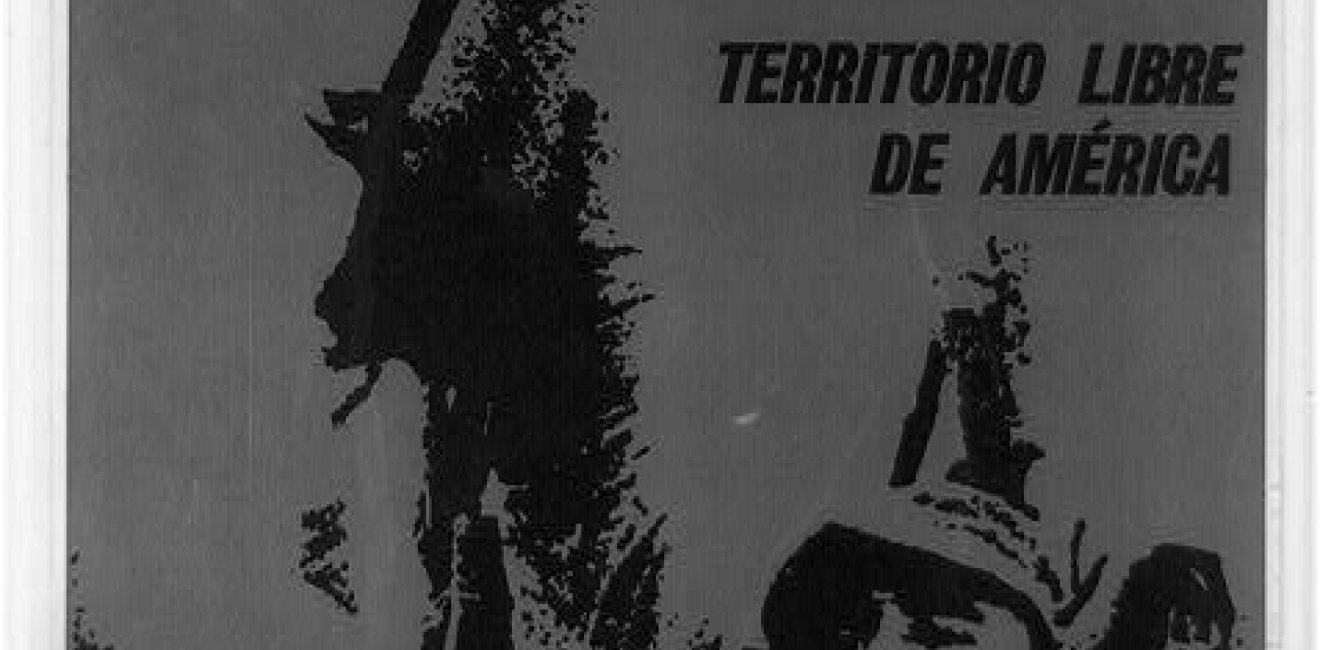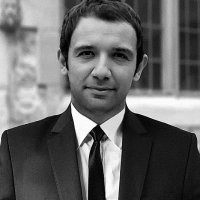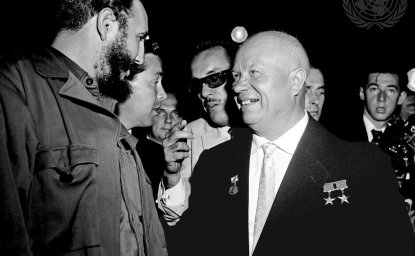The 1962 Cuban crisis was a major historical event that set the tone for Eastern Europe’s unified critical discussion of Cuba through most of the 1960s.
The eventful decade was marked by three distinct periods: first, the formative years of Cuba-Eastern Bloc relations culminating with the Missile Crisis, followed by the worsening of relations in the aftermath of the crisis, and concluding with a notable cooling until the closing months of the 1960s.
The so-called Cuban export of revolution in Latin America came at a time when Havana attracted the East’s criticism along ideological and party-building lines. Ultimately, the attempts at political liberalization in Czechoslovakia had strong repercussions on Cuba and its relations with the Soviet Union.
As the resolution of the October 1962 standoff between Kennedy and Khrushchev brought about a notable cooling between Havana and the Soviet Bloc, the East’s envoys to Havana grew considerably more irritated, which made them less restrained in openly criticizing the country’s domestic situation. The Polish security services noted Havana’s highly restrictive nationalistic policies and, above all, the difficult economic situation, which they believed led to a gradual decline in the popularity of Fidel Castro and his group.[1]
The slow pace of the formation of the new Cuban Communist Party was another acute issue. In Hungary, Soviet top party officials claimed that the Cuban leaders had difficulties coping with Marxism as they were trying to master it.[2] Despite their growing impatience with Fidel, however, in an attempt to soften the East European criticisms, Soviet Ambassador Alekseev argued with his Hungarian counterpart that the Cuban leaders were still young and needed some time to become “true communists.” Still, he found it unfortunate that “experienced old communists,” including Blas Roca and Carlos Rafael, were “weak” and unable to defend often neglected communist postulates in economics, party politics, and domestic affairs.[3]
For their part, East Berlin’s diplomats also appeared unimpressed by Fidel’s behavior on the ideological front. The GDR’s envoy offered one of the most poignant criticisms of the so-called group of “fidelists” (fidelistas) who were not adhering to communist or Marxist ideology, liking their “pseudo-scientific and pseudo-revolutionary” credo to an “eclectic-pragmatic mixture of petty-bourgeois ultra-left adventurism, nationalist arrogance, Trotskyist and Chinese conceptions, and Western European neo-Marxist theories.” Despite this extremely harsh assessment, Ambassador Naumann discounted the importance of the “fidelists” and the “pure revolutionaries,” as Fidel consistently proclaimed publicly to be faithful to Marxist beliefs and to be close to the socialist countries.[4]
Towards the mid-1960s Castro’s revolutionary pursuit began to attract even more openly the criticism of the East European communist parties. Cuban aspirations to lead the communist movement in Latin America prompted its leaders to question the avant-garde character of Latin American communist parties and recognize guerrilla movements as the leading centers of revolutionary struggle. Warsaw’s intelligence services were equally critical, accusing the Cubans of opportunism. In this view, the Cuban Communist Party was seen as only recognizing and cooperating with those Latin American revolutionary movements that submitted to its leadership, regardless of their political orientation, mostly comprising armed guerrilla groups that opposed the Communist parties in their countries.[5]
The question of Cuba’s relations with Latin America also appeared in high-level conversations between Soviet and East European officials. For example, in one such exchange, Romanian Communist Party ideologue Paul Nicolescu-Mizil told his Soviet colleague Boris Ponomarev in early 1968 that Latin American communists were complaining to their Eastern European comrades about Cuba’s interference in their internal affairs.[6]
Additionally, Fidel attracted blame for his improvisational style in a highly critical Hungarian appraisal. As he never wrote or consulted his speech with the party and government leaders beforehand, under the influence of momentary emotions, he was sometimes caught saying things that were “appalling” and contrary to the fundamental interests of Cuba's foreign policy, the report concluded. As a result, not only American journalists but also the ambassadors of the socialist countries were guessing and discovering new information about changes in the Cuban-Soviet relationship from his speeches, not knowing what to do or what to make of them.[7]
With Khrushchev’s replacement as the CPSU's General Secretary on 14 October 1964, Soviet Deputy Premier, Anastas Mikoyan, who was among the most ardent supporters of the Cuban revolution in the Kremlin, lost his influence in Soviet politics. In Cuba, the change in the Soviet top leadership came as a “shock” and was met with “strong distrust,” as Prague’s diplomats reported.[8]
Furthermore, in early 1968, the process of internal division within the new Cuban Communist Party, known as microfaction, represented the lowest point in the ideological conflict between Havana and Moscow in the 1960s. An East Berlin report delivered a harsh assessment of the process, arguing that the microfaction exacerbated Havana’s mistrust of Moscow, which it accused of sowing discord within its ranks, aggravating the political-ideological relations with most of the socialist countries and the international communist movement.[9]
Castro’s support for the Moscow-led invasion of Czechoslovakia, expressed in a televised address on 23 August 1968, did not lead to an immediate improvement in Cuban-Bloc relations. A conversation between Moscow’s Chargé d'Affaires in Cuba, Dunin, and East Berlin’s Ambassador, Neumann, in October 1968 showed their agreement that the Cuban Communist Party’s position on Czechoslovakia was primarily to be seen as a tactical measure aimed at Cuba’s complicated political and economic situation. This view was also expressed in the statements of leading Cuban officials to the Bulgarian Ministry of the Interior delegation. According to a Bulgarian embassy official, while publicly appearing closer to the socialist countries regarding the events in Czechoslovakia for tactical reasons, the PCC was more distant than ever from them on ideological and political matters.[10]
However, with the decade drawing to a close, facing the increased criticism of its closest allies, the Cuban leaders displayed remarkable adaptability in reconciling their revolutionary missions and the need to sustain its vulnerable mono-cultural economy under dire economic pressures which led to a gradual thaw in relations between Havana and the East which we will look at in the next blog post.
Connected Sources
Note regarding the Intelligence Situation in Cuba, 1969 May 15
Report to the Political Committee on the Consultation Meeting with Comrade J. Andropov and Comrade A. Gromyko, 1966 December 28
Copy of the Report of the Embassy in Havana Ddated February 26, 1963; Subject: 'The Political Situation in Cuba', 1963 February 26
Embassy of the GDR in the Republic of Cuba, 'Draft of a Concept for the Plenum of the Central Committee of the Communist Party of Cuba from 24 to 26 January 1968', 1968 February 03
Note on the Preliminary General Intelligence Situation, 1967 February 27
Transcript of Discussions between Comrade Paul Niculescu-Mizil and Comrade Boris N. Ponomariov, Secretary of the CC of the CPSU, 1968 February 16
Erzsébet Görög, Charge d’affaires, 'Cuban Foreign Policy in the Light of Two Castro Speeches', 1963 December 03
Echo of Recent International Events in Cuba, 1964 November 17
Letter, Charge d'Affaires Kulitzka to Ministry of Foreign Affairs Comrade Dr. Butzke, Head of the Latin America Department, 1968 June 19
Letter from Dr. Baumann to Deputy Minister for Foreign Affairs Gen. Dr. Kiesewetter, 1968 October 22
[1] “Niektórych elementów sytuacji wywiadowczej w Republice Kuby” [Certain elements of the intelligence situation in the Republic of Cuba], 15 May 1969, Instytut Pamieci Narodowej (Institute of National Remembrance), Warsaw, (IPN), BU 2602/12757, p. 3 [277].
[2] „Jelentés a Politikai Bizottságnak J. Andropov elvtárssal es A. Gromikó elvtárssal folytatott konzultációs megbeszélésről” [Report to the Political Committee on the consultation meeting with Comrade J. Andropov and Comrade A. Gromyko], 28 December 1966, Magyar Nemzeti Levéltár (National Archives of Hungary), Budapest, (MNL), M-KS, 288, f. 11/2014 o.e, p. 12 [13].
[3] János Beck, “A politikai helyzet Kubában” [The political situation in Cuba], 26 February 1963, MNL, M-KS, 288 f. 32, 1963, 11 ő.e, p. 4 [26].
[4] [GDR Ambassador] Naumann, „Entwurf einer Konzeption für die Berichterstattung über das Plenum des ZK der KPK vom 24.-26.1.1968“ [Draft of a concept for reporting on the plenary session of the KPK Central Committee from January 24-26, 1968], 3 February 1968, Politisches Archiv des Auswärtigen Amts (Political Archive of the Federal Foreign Office), Berlin, (PAAA), MfAA, M3/72, p. 6.
[5] „Notatka z wstępnej - ogólnej sytuacji wywiadowczej“ [Note of the preliminary-general intelligence situation], 27 February 1967, IPN, BU 2602/12757, p. 1 [266].
[6] See Venezuelan and Romanian comments on Cuban interference in: Memorandum of Conversation, P. Niculescu-Mizil - B. N. Ponomarev, 16 February 1968, Arhivele Naţionale ale României (National Archives of Romania), Bucharest, (ANR), CC al PCR, Relații Externe, 31/1968, p. 15 [16].
[7] Erzsébet Görög, “A kubai külpolitika két Castro beszéd tükrében” [Cuban foreign policy in the light of two Castro speeches], 3 December 1963, MNL, M-KS, 288 f. 32, 1963, 11 ő.e, p. 1 [94].
[8] „Ohlas posledních mezinárodních události na Kubě“ [Echo of recent international events in Cuba], 17 November 1964, Národní Archiv České Republiky (National Archives of the Czech Republic), Prague, (NAČR), f. KSČ-Ústředny výbor 1945-1989, Praha - Antonín Novotný II část, karton 121, pp. 3-4.
[9] Kulitzka [Chargé d'affaires a. i.] for Butzke [Head of Latin America Department, MfAA], 19 June 1968, PAAA, M3/72, p. 2.
[10] [GDR Ambassador in Cuba] Naumann to [GDR's Deputy Foreign Minister] Kiesewetter, 22 October 1968, PAAA, M3/72, p. 2.








